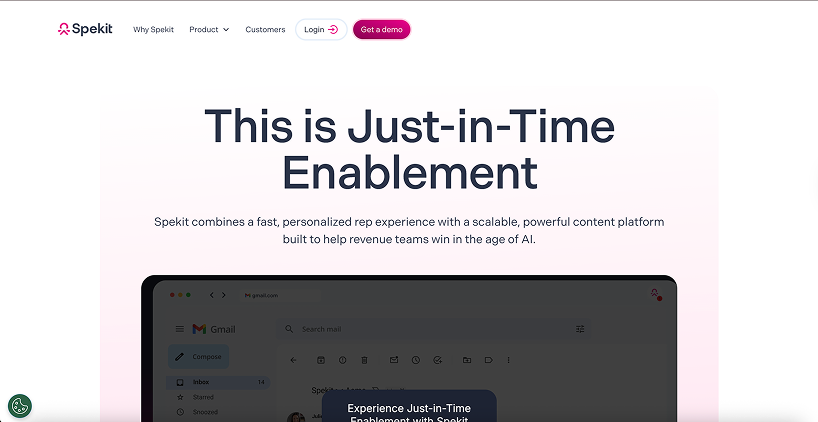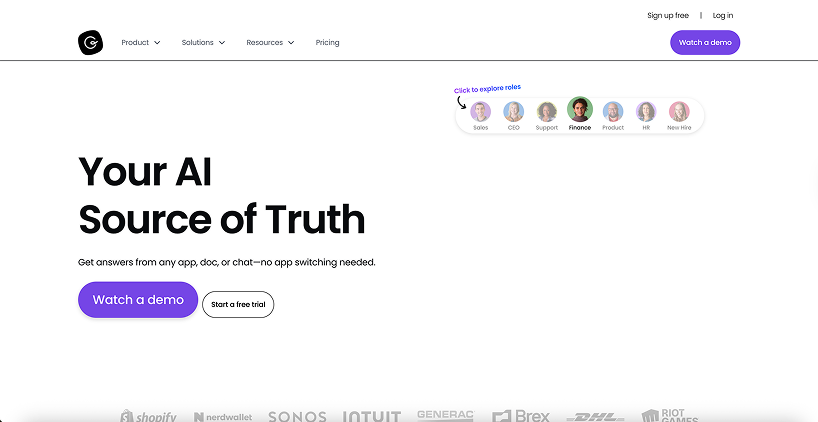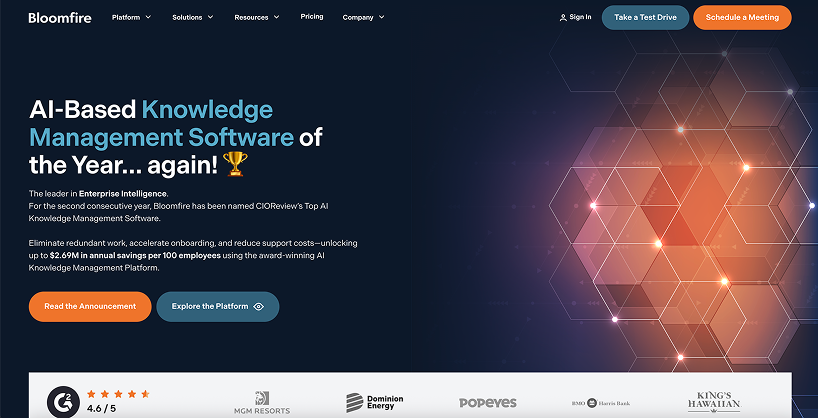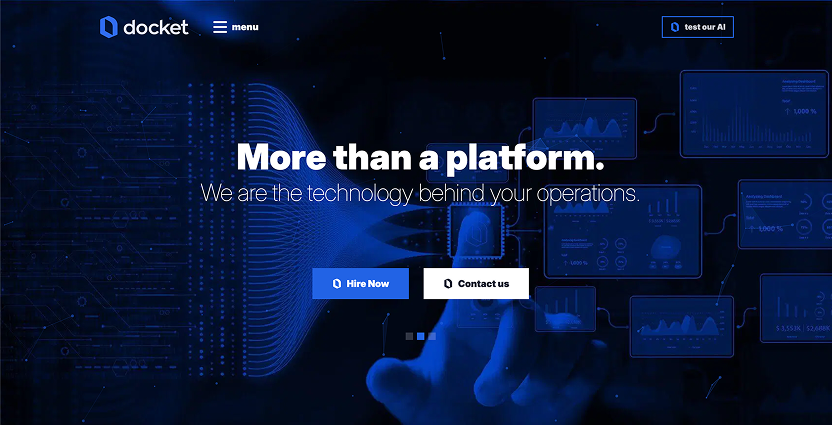The Best Platforms Offering Automated Sales Knowledge Management in 2025
Modern GTM teams are sitting on gold, but most of it’s buried in tribal notes, forgotten Slack threads, untagged recordings, and stale internal wikis. Sales calls, objection handling tactics, pricing discussions, buyer signals… This is the knowledge that drives revenue. But without automation, it never gets captured, organized, or shared effectively.
That’s why automated sales knowledge management platforms are indispensable. These AI-powered systems go beyond information storing and structure, surface, and activate it across your GTM stack. They integrate directly with Slack, CRMs, and other sales apps, enabling reps to get real-time answers, content, and next-best actions without toggling tabs or rehashing the same questions.
What’s changed in 2025? The rise of AI assistants, generative AI, and workflow automation has transformed what knowledge management systems can deliver. Today’s platforms offer instant search functionality, automated CRM updates, and intelligent alerts triggered by call insights or deal signals.
The stakes are sales velocity, onboarding efficiency, rep productivity and your ability to act on customer signals before competitors do.
This guide is built to help GTM, RevOps, and enablement leaders evaluate the best platforms offering automated sales knowledge management. Whether you're scaling onboarding, reducing time-to-productivity, or surfacing key deal insights faster, this guide breaks down what these platforms actually do, which features matter most, and how top tools compare.
We’ve distilled in-depth research and firsthand platform analysis into a clear framework, so you can confidently choose a solution that fits your team’s workflow, tech stack, and scalability needs.
What Is Automated Sales Knowledge Management?
At its core, automated sales knowledge management refers to AI-powered platforms that capture, structure, and serve up sales-critical knowledge in real time. Think of it as a dynamic, centralized repository for everything your sales team needs: call summaries, competitive intel, product FAQs, deal notes, and more, updated automatically, not manually.
Unlike legacy wikis or passive knowledge bases, these platforms use natural language processing (NLP), machine learning, and generative AI to turn unstructured interaction data into searchable content. This includes:
[blue-section]
- Extracting MEDDPIC fields from call transcripts
- Tagging competitor mentions or pricing objections
- Auto-updating Salesforce or HubSpot
- Delivering contextual tips inside Slack, email, or CRM
[/blue-section]
In short, they transform messy tribal knowledge into structured, accessible intelligence that fuels faster decisions and streamlined execution.
Common Challenges GTM Teams Still Face
Even with CRM systems, enablement tools, and chat apps in place, most teams hit the same friction points:
[blue-section]
- Silos and duplication: Critical content scattered across Google Docs, Notion, outdated enablement portals, or buried in Slack.
- Manual upkeep: Sales ops teams spending hours updating FAQs, chasing reps for call notes, or auditing CRM fields.
- Slow onboarding: New reps take weeks (or months) to ramp because there’s no fast way to share knowledge.
- Inconsistent messaging: No single source of truth means reps use old templates, off-brand talk tracks, or outdated collateral.
- Missed signals: Churn warnings, objections, and key buyer questions get lost because insights live in call recordings no one listens to.
[/blue-section]
Legacy knowledge management software wasn’t built for fast-moving, AI-augmented sales teams. It’s time for tools that support real-time collaboration, embedded chatbot access, and automated updates driven by your actual customer interactions.
What to Look For: Key Features of Modern Sales Knowledge Management Tools
When evaluating automated knowledge management platforms, here are the 7 features to prioritize:
[number-block number="1"]
AI-Powered Indexing and Search
- What it does: Uses NLP to automatically categorize topics (e.g., pricing, competitors, use cases) and support natural-language questions like “What did Acme say about budget?”
- Why it matters: Helps reps find the right knowledge without wasting time. Look for tools with ai-powered search capabilities inside Slack or your CRM.
- Avoid: Static search bars with poor formatting or outdated indexing. You need speed and intelligence.
[/number-block]
[number-block number="2"]
Seamless CRM and Workspace Integrations
- What it does: Syncs with tools like Salesforce, HubSpot, Slack, Zoom, and Microsoft Teams to auto-update fields and deliver real-time alerts.
- Why it matters: Sales teams shouldn’t toggle across tools. Embedded integrations make knowledge management part of daily workflows.
- Avoid: Platforms that require constant tab switching or API workarounds.
[/number-block]
[number-block number="3"]
Automated Note-Taking and CRM Updates
- What it does: Transcribes meetings, captures action items, and populates your CRM fields automatically.
- Why it matters: No more chasing reps for follow-ups or manual data entry. Supports pipeline visibility and coaching.
- Avoid: Summary-only tools with no CRM writeback.
[/number-block]
[number-block number="4"]
Real-Time Alerts and Signal Detection
- What it does: Triggers alerts in Slack or CRM when certain phrases or events are detected—like pricing pushback, new decision-maker, or competitor mention.
- Why it matters: Prevents dropped balls and fuels proactive selling. Some tools even trigger workflows like escalation or renewal reviews.
- Avoid: Tools that overload teams with low-value notifications.
[/number-block]
[number-block number="5"]
Generative AI and Content Creation
- What it does: Auto-generates summaries, follow-up emails, and knowledge articles from call transcripts or templates.
- Why it matters: Speeds up onboarding, sales enablement, and content management while keeping messaging consistent.
- Avoid: Platforms that hallucinate or generate content without relevance or traceability.
[/number-block]
[number-block number="6"]
Access Controls and Version Control
- What it does: Allows you to set permissions, manage feedback loops, and track version history of documents and knowledge assets.
- Why it matters: Ensures that only verified content is shared with the team, keeping quality and compliance high.
- Avoid: Tools with no audit trail or governance structure.
[/number-block]
[number-block number="7"]
Analytics and Insights
- What it does: Tracks usage patterns, content performance, and engagement across the sales org.
- Why it matters: Helps identify knowledge gaps, streamline training, and optimize your content dashboards for impact.
- Avoid: Platforms without clear metrics or visibility into what’s working.
[/number-block]
Top Platforms for Automated Sales Knowledge Management
Below are five leading platforms that deliver modern, AI-powered sales knowledge management. Each offers distinct strengths in functionality, automation, and user experience. Use this comparison to find the tool that aligns with your workflows, integrations, and specific GTM needs.

::autoboxgrid2
[LEFT]
Best for:: GTM and RevOps teams needing real-time knowledge extraction, Slack workflows, and pipeline orchestration
Pricing:: Custom pricing based on team size and configuration
Key features::
- AI notetaker and CRM auto-updates (e.g. MEDDPIC, churn, decision-makers)
- AI-powered call summaries and follow-up emails
- Slack-native workflows: Deal Rooms, alerts, escalations
- Role-based AI agents: Coaching, Retention, CRO, and more
- Deep Salesforce integration, no manual entry required
[RIGHT]
Strengths::
- Unifies insights from sales calls, docs, emails into a single knowledge base
- Eliminates admin burden with automated CRM and Slack updates
- Powerful real-time signal detection for risk and buyer intent
- Accelerates onboarding and improves decision-making through in-context alerts
Considerations::
- Not a document storage platform, designed to orchestrate workflows from knowledge, not just store it
- Best suited for mid-market and enterprise GTM motions
Why Momentum:: For revenue teams seeking a centralized repository that’s fully embedded into sales execution, not just another wiki, but a knowledge management solution built to take action.
::endautoboxgrid2
2. Spekit

::autoboxgrid2
[LEFT]
Best for:: Sales enablement teams prioritizing contextual, bite-sized knowledge access
Pricing:: Tiered (starts ~$30–50/user/month)
Key features::
- Centralized internal knowledge base with search functionality
- Embedded in Slack, Salesforce, Outlook, and Chrome
- “Speks”: Micro-content cards for FAQs, playbooks, objection handling
- AI tools for content creation and article updates
- Usage analytics and engagement tracking
[RIGHT]
Strengths::
- Easy-to-consume format, great for ramping new team members
- Smart surfacing in the flow of work (contextual help widgets)
- Strong collaboration features and content governance
Considerations::
- Not optimized for dynamic call insights or automated CRM updates
- Limited generative AI functionality compared to orchestration platforms
Why Spekit:: Ideal for small businesses, support teams, or startups that want a lightweight, scalable way to share knowledge and reduce ramp time.
::endautoboxgrid2
3. Guru

::autoboxgrid2
[LEFT]
Best for:: Teams needing a robust, card-based knowledge management platform with workflow integrations
Pricing:: Free plan available; paid tiers start ~$5–$20/user/month
Key features::
- AI-powered search engine and knowledge suggestion assistant
- Chrome extension for in-app access to company knowledge
- Slack and Microsoft Teams integration
- Structured “cards” for process docs, playbooks, templates
- Access and version control
[RIGHT]
Strengths::
- Excellent for building a scalable knowledge wiki
- Fast self-service onboarding for new reps and cross-functional users
- Collaboration tools support team-wide documentation
Considerations::
- Limited native automation; no real-time CRM updates
- Better suited for document management than GTM execution
Why Guru:: Best for companies needing a structured, low-friction way to streamline content access across the org.
::endautoboxgrid2
4. Bloomfire

::autoboxgrid2
[LEFT]
Best for:: Enterprises managing large, multimedia knowledge libraries across sales, support, and product
Pricing:: Quote-based; generally mid to enterprise pricing
Key features::
- AI-driven Q&A assistant and knowledge base software
- Supports text, video, audio, and forum content
- Integrates with Slack, Microsoft Teams, and CRMs
- Content analytics and knowledge gap detection
- Strong permissions, tagging, and formatting tools
[RIGHT]
Strengths::
- Built to handle large datasets and enterprise-scale documentation
- Great for hybrid support teams and sales teams needing cross-department knowledge
- Real-time dashboards surface trending questions and insights
Considerations::
- Heavy for lightweight sales enablement use cases
- More of an all-in-one KM suite than a sales-focused orchestration tool
Why Bloomfire:: The right choice for companies wanting to turn sprawling, cross-functional content into a centralized repository with smart search functionality.
::endautoboxgrid2
5. Docket

::autoboxgrid2
[LEFT]
Best for:: Sales teams looking for an AI-driven assistant that connects conversation insights directly to answers
Pricing:: Mid-tier; typically subscription-based per user
Key features::
- Post-call AI transcription and CRM logging
- Slack-based AI assistant for sales Q&A
- Auto-curation of FAQs and tribal knowledge
- Smart Slack suggestions when a question has already been answered
[RIGHT]
Strengths::
- Real-time Slack integration for fast knowledge sharing
- Lightweight, easy to deploy in fast-moving teams
- Continually updates company information from calls and meetings
Considerations::
- Limited content governance and editorial workflows
- Not ideal for content-heavy onboarding or full-scale KM systems
Why Docket:: Ideal for sales teams needing quick access to conversational insights without spinning up a full-blown knowledge management tool.
::endautoboxgrid2
Comparison Table: Leading Automated Sales Knowledge Management Platforms
::autotable
::columns=7
Platform
Best For
AI Functionality
CRM/Slack Integration
Knowledge Format
Strengths
Considerations
Momentum.io
RevOps teams needing AI-powered real-time actions
AI agents, call summaries, MEDDPIC, alerts
Deep Salesforce & Slack
Structured fields, action items
Execution-ready workflows, alerts, Slack automations
Not a wiki or doc store, built for orchestration
Spekit
Enablement teams needing in-app microlearning
AI-generated snippets, usage insights
Slack, Salesforce, Outlook
Bite-sized “Speks”, templates
Embedded help, easy content creation
Limited real-time call intelligence
Guru
Teams needing centralized Q&A and process cards
AI search, content suggestions
Slack, Chrome, MS Teams
Card-based knowledge hub
Fast access, version control, scalable wiki
No real-time automation or CRM writebacks
Bloomfire
Enterprises with large, multimedia content bases
AI-powered Q&A, trend analysis
Slack, CRMs, Microsoft Teams
Docs, video, forums
Handles scale, detailed content tagging
Heavier setup, not tailored to sales workflows
Docket
Sales teams needing call-to-answer Slack assistant
AI summaries, Slack-based Q&A bot
Zoom/Teams + Slack + CRMs
Tribal knowledge, FAQs
Quick replies, real-time Slack assistance
Less editorial governance, no robust content workflows
::endautotable
Why Momentum Is Your Sales Orchestration Advantage
Other platforms focus on search, documentation, or content delivery. Momentum focuses on action.
Momentum is more than a knowledge management system, it’s a real-time revenue orchestration layer powered by AI. It’s built specifically for fast-moving GTM teams that need to:
[white-section]
- Capture insights instantly from calls, emails, and meetings
- Auto-update CRM fields with contextually rich data (like pain points, objections, next steps)
- Trigger Slack workflows, deal desk reviews, red flag escalations, renewal approvals, without rep intervention
- Analyze customer conversations and automatically flag churn signals, decision-maker changes, or new use cases
- Eliminate silos and enforce GTM process without adding complexity to the stack
[/white-section]
In short, Momentum activates knowledge across your workspace.
Product-Specific Benefits That Set Momentum Apart:
- AI-powered summaries from every call, automatically tagged and synced into Salesforce
- Auto-populated CRM fields and MEDDPIC data, no rep follow-up needed
- Trigger-based workflows and alerts in Slack, tailored to your GTM motions
- Modular AI Agents (like Customer Retention or AI-CRO) that adapt to use cases across sales, CS, and RevOps
- Built-in collaboration tools for cross-functional visibility across deals and onboarding
- SOC 2 certified, with clear access controls and governance—ready for enterprise
Momentum is the only AI-driven solution purpose-built to convert knowledge into execution at scale.
Ready to Optimize Your Sales Knowledge and Workflows?
If your team is spending too much time documenting, searching, or cleaning CRM data, it's time to streamline.
Thousands of GTM leaders use Momentum to:
- Align sales and customer support teams through centralized knowledge
- Deliver real-time signals and surface the right knowledge when it matters most
- Automate follow-ups, CRM updates, and Slack-based collaboration
- Eliminate silos between conversation intelligence, documentation, and execution
[blue-section]
Book a demo today to see how Momentum integrates with Salesforce, Slack, Zoom, HubSpot, and more, automating your most valuable sales workflows while improving rep performance, customer experience, and forecasting accuracy.
Let AI-powered automation handle the busywork so your team can focus on what matters most: revenue.
[/blue-section]




.svg)

